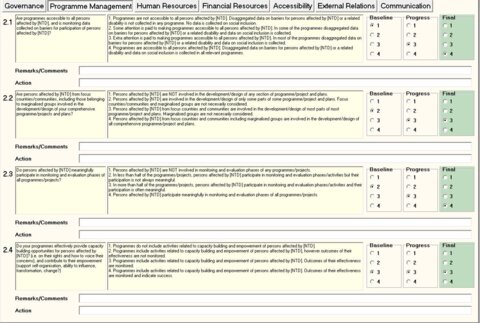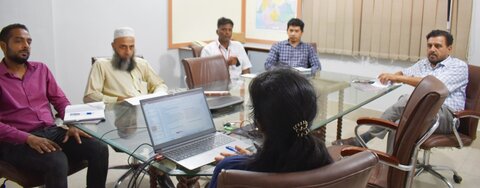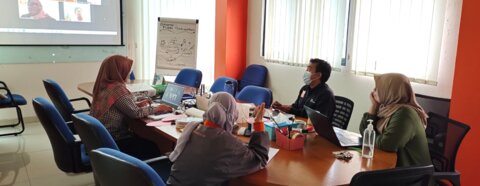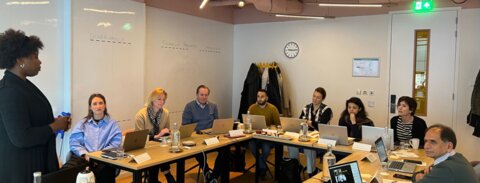From Words to Action: Introducing the NTD Inclusion Score Card (NISC)
What is the NTD Inclusion Scorecard?

The NTD Inclusion Scorecard (NISC) is the collaborative effort of the NNN cross-cutting working group on Disease Management and Disability Inclusion (DMDI). Following the adoption of the NNN commitment on participation in 2020, the Participation and Livelihood working group of the DMDI set out to develop the NISC. The primary objective of the NISC is to hold NTD organizations accountable to the NNN commitment on the participation of persons affected by NTDs and the ILEP statement on the participation of persons affected by leprosy. When NTD organizations ensure the inclusion and meaningful participation of affected individuals in their policy and decision-making processes, the stage is set for more effective and successful NTD interventions.
The NISC assesses inclusion in NTD organisations in seven essential domains: Governance, Programme Management, Human Resources, Financial Resources, Accessibility, External Relations, and Communication. This comprehensive evaluation equips organizations with a clearer understanding of challenges and gaps in the inclusion of individuals affected by NTDs, empowering them to take meaningful action.
A journey of Impact

Prior to my time on the “From Words to Action” project which began in December 2022, I considered myself quite knowledgeable on the topic of inclusion of marginalised persons. Upon reflection, I was only about to embark on a journey of enlightenment on what inclusion really meant in practice, especially with regards to persons affected by NTDs. The development and launch of the NTD Inclusion Score Card (NISC) have been a demonstration of inclusion and meaningful participation of persons affected by NTDs. As participants in initial NISC consultations organised by the Participation and Livelihood working group of the DMDI in various forums, as well as participants in the various NISC pilots, persons affected by NTDs have been valuable contributors on what the content of the NISC should be like and have also participated in promoting the finalized tool. Their participation during the pilot in clarifying and discussing the definition of inclusion and meaningful participation, ensured that the content of the scorecard was also shaped by persons affected by NTDs in a meaningful way and reflect their viewpoints. The pilot process also expanded the perspectives of both persons affected and NGO staff members and I, on what inclusion entails:
Quote from a NISC pilot participant: “I knew already about my rights as a person affected. But now seeing the questions from the tool, in reality I feel that I’m still ignored in many things [as highlighted by] the questions of the NISC.” – Person affected
The NISC tool was piloted in 12 NTD organizations across Africa, Asia, Europe & South America, and some have already begun to show impact them taken actions to address gaps identified from their use of the score card. To bring about substantial change and ensure the meaningful participation of individuals affected by NTDs in policy and decision-making processes, we need tangible action. The NISC provides the necessary framework for this transformation. However, it will take courageous change managers within NTD NGOs to drive this process forward.
Quote from a NISC pilot participant: “We had our country director as participant and we all agreed on how we can make some changes in our work, it was good to have, and I think it would be easier to implement the change or improvement.” – Program Management Participant
How do you conduct a NISC assessment?

Using the NISC is a straightforward process. All it requires is a roundtable discussion involving representatives from your organization who cover each domain outlined in the tool. In the spirit of inclusivity and accountability, it's crucial to have at least one person affected by an NTD present during this discussion. An external facilitator is also recommended to lead the discussion. As a team, you'll read the questions within each domain, discuss your organization's current status, agree on a score reflecting this position, and collaboratively devise steps to address any identified gaps. Think of it as a 'continuous quality improvement' process, with a strong focus on the inclusion of persons affected by NTDs, so you can repeat the process after a year to evaluate your progress. The NISC can be accessed via www.infontd.org/NISC and is available in English, French, Hindi, Spanish and Portuguese.
A call to Action

Now is the time to utilize the NISC. The NISC is a valuable resource for NTD organizations with decision-making responsibilities, whether at the national or international level. Discover how your organization measures up in terms of inclusion and meaningful participation of individuals affected by NTDs and explore opportunities for improvement. From words to action, let's embark on this journey of true inclusivity and impact.
If you have any questions or would like our support in setting up or facilitating the NISC assessment in your organisation, please contact: Bernice @ b [dot] ejiogu [at] nlrinternational [dot] org or Robin @ r [dot] vanwijk [at] nlrinternational [dot] org